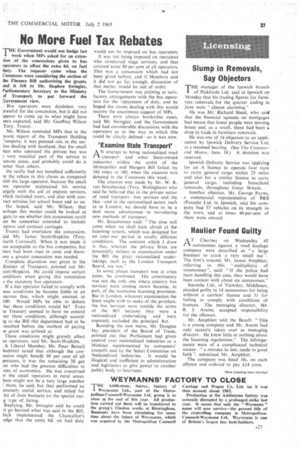No More Fuel Tax Rebates
Page 29

If you've noticed an error in this article please click here to report it so we can fix it.
THE Government would not budge last I week when MPs asked for an extendon of the concessions given to bus operators to offset the extra 6d. on fuel duty. The requests came when the Commons were considering the section of the Finance Bill authorizing the grants, Ind it fell to Mr. Stephen Swingler, Parliamentary Secretary to the Ministry Transport, to put forward the Government view.
Bus operators were doubtless very ;rateful for the concession, but it did not ippear to come up to what might have 3een expected, said Mr. Geoffrey Wilson Tory, Truro).
Mr. Wilson reminded MPs that in the tecent report of the Transport Holding 2ornpany, it was pointed out, in the secion dealing with Scotland, that the small nan who operated the private bus was t very essential part of the service in 'emote areas, and probably could do it ietter than othcrs.
He really had not benefited sufficiently )y the rebate in this clause as compared vith the large operator, because the small ills operator maintained his service argely with the aid of express services, vhich included tours, and also with conract services for school buses and so on. He hoped, said Mr. Wilson, that )erhaps this matter could be looked at .gain to see whether this concession could tot be somewhat extended to include xpress and contract carriages.
Events had overtaken the concession, aid Mr. James Scott-Hopkins (Tory, forth Cornwall). When it was made it was acceptable to the bus companies, but here had been rises in costs and there ore a greater concession was needed, Complete discretion was given to the dinister of Transport, pointed out Mr. cott-Hopkins. He could impose certain onditions when giving this concession 3 the statutory bus operators.
If a bus operator failed to comply with iese conditions he became liable to an nerous fine, which might amount to 100. Would MPs be able to debate that these conditions would be? Even se Treasury seemed to have no control ver these conditions, although accord% to the Bill this department had to be 3nsulted before the method of paying le grant was arrived at.
These conditions might gravely affect us operators, said Mr. Scott-Hopkins. A Liberal Member, Mr. Peter Beisell 3odmin) noted that although the con %sion might benefit 80 per cent of all perators, it was the remaining 20 per nit who had the greatest difficulties in rms of economics. He was concerned ir the small operators in rural areas. here might not be a very large number E them, he said, but they performed an aremely useful service, and relied for lot of their business on the special outg type of hiring.
Replying, lvl,r. Swingler said he could it go beyond what was said in the Bill, hich implemented the Chancellor's edge that the extra 6d. on fuel duty would not be imposed on bus operators.
It was not being imposed on operators who conducted stage services, and that covered some AO per cent of all operators. This was a concession which had not been given before, and if Members said it did not go far enough, discussion of that matter would be out of order.
The Government was arriving at satisfactory arrangements with the bus operators for the repayment of duty, and he hoped the clause dealing with this would receive the unanimous support of MPs.
There were always borderline cases, said Mr. Swingler, and the Government had had considerable discussions with the operators as to the way in which this could be clearly defined--as it was now.
























































































































